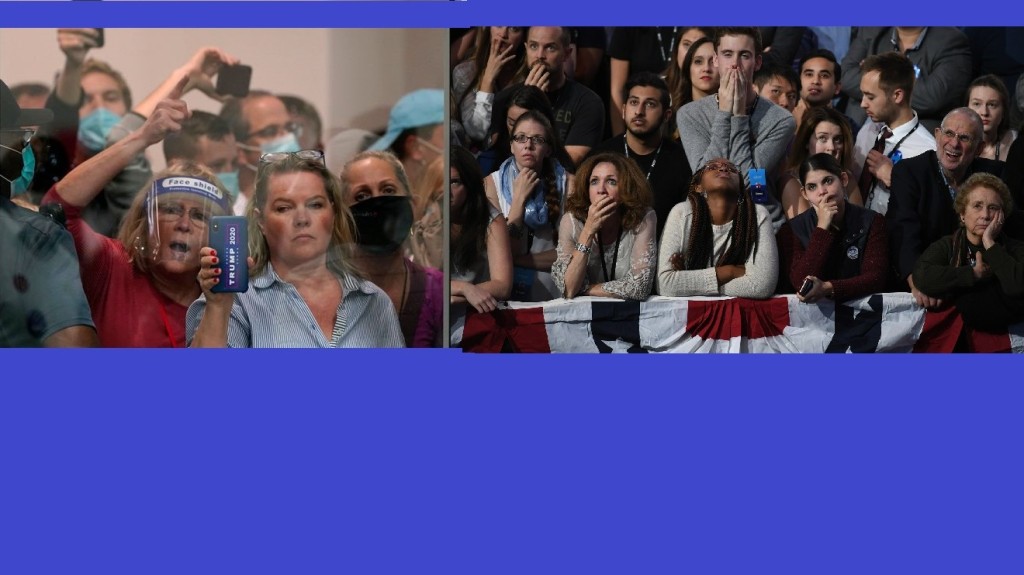“You don’t forget the face of the person who was your last hope.”
“Of course, we’re fickle stupid beings, with poor memories and a great gift for self-destruction. Although, who knows? Maybe this time, we’ll learn.”
—The Hunger Games
If you look at these two photos, it would appear not much has changed in four years. Sure, different people in each, but both with a look of despair and loss. It looks as if their whole lives hinged on an election, someone who would save them from the other, or better yet, save them from themselves.

Yet, despite different people on opposite sides of their religion’s spectrum, both end in this sense of despair and defeat, as if their own savior had been crucified. Chants of “crucify her, crucify her!” followed the same, “crucify him, crucify him!”
If history teaches anything, though, crucifying is rarely the answer. Even what we have hated the most finds a way to resurrect, the very thing which was a threat to our own power and belief system, finds a way to manifest itself over and over again. “Maybe this time, we’ll learn.”
Probably not. We rarely do.
You know why? We’ve come to believe that the people in the two photos are different from one another. We’ve allowed ourselves to be conditioned to believing they’re the “enemy” needing to be destroyed. “They” are the obstruction to a vision, whether real or not, that we hold so tightly to of who we’re supposed to be and we fail to see our mutual despair, hurt, and pain.
We inevitably become what we hate. The cycle continues.
What I am most grateful for is travel. The opportunity to travel to varying parts of the world, especially some of the poorest of the poor, have opened my eyes to another world. There’s a stark difference, though, when you travel to such places.
Despite the circumstances which we’d deem less than human, there is very little despair. In the simplest of people and “you don’t forget the face of the person who was your last hope”.
Here, though, pain and suffering continue to be passed from one generation to the next. Despair tossed like a hot potato and whoever comes up short carries the burden for their time before the game once again begins.
The ball only seems to get heavier with time, piling on lost dreams, visions of a country which never were, resentments, failed expectations, grievances which may be grounded in reality or not, mistrust, the aged story of the Hatfield’s and McCoy’s carries on, like two families who only know each other through their judgment, fear, and the unknown.
Better yet, what they’ve been told and taught about the other. Often coming through voices manipulating our pain for their own personal gain.
There comes a time, though, when we must reckon with ourselves. In a nation priding itself on possibility, despair mustn’t be a reality.
Reality is all we have but we prefer the illusions and even delusions, at times, rather than dealing with this pain and suffering which continues to drive our decisions. When we fail to deal with the pain, we inevitably transmit it onto the other, the perceived enemy.
We blame. We allow ourselves to be victims. We abort our own lives.
We get caught up in a hope rooted in a past or a hope rooted solely in the future all to avoid the pain of today, the pain of this moment in time.
There should be no surprise, when we view this reality through the human condition, as to why one is elected and not the other, one accepted while the other rejected. It’s merely the passing of the ball, the burden, onto the other.
We find ourselves at a time in which pausing and reflecting are a necessary pursuit. If you were the one four years ago or feeling the sting right now, we need to ask ourselves, “Why?”
Why is there so much despair?
Why do we cling so tightly and to what?
What is it we believe we need to be saved from?
Who are you, and even more so, who am I through you?
The voices of crucifixion are intentional. They’re placed there by those craving power. It is the timeless voice which works the best to divide the people, to shame people, and yet a people who have more in common than not.
Your religion, a hard pill to swallow, has failed you, over and over again.
The path forward is an interior one. The superficialities of issues and culture wars only cause war with ourselves out of threat of a future damnation. The path is one of dialogue, especially with the unknown.
The path to healing and wholeness will always take you where you most fear to go, the hell of your own pain and suffering.
For many, you’re already there. It feels like despair.
Your choice?
What you decide to do with it.
Transmit or transform.
“Maybe this time we’ll learn.”
